Rashaun J. Allen's Blog
July 23, 2024
My Installed Poem Commemorating The Previously Enslaved.
“RXR builds a luxury apartment on top of unmarked graves” could have easily been a headline on a Westchester paper.
About 16 months ago, I submitted a proposal to write a commemorative poem. I was a lil’ skeptical since every other submission I applied for required the poem to go with the application. But this one was different. It was from a construction company. The task was to create a poem recognizing the history of enslaved people in New Rochelle, whose stories have not been sufficiently told.
This poem would potentially negate any possible bad press and shed light on a past injustice. To me, it was right up my lane. It reminded me of my poem #blackspaces from #thebluescryforarevolution. And it was not just RXR asking. But the New Rochelle Historical Society, New Rochelle’s African American Advisory Committee, and other stakeholders wanted to see the poem come to fruition.

Fast forward, to last November, I got the email to write it. But the writing process wasn’t just scribbling at my desk. I had to connect deeper with the community for it to be genuine. Deep like searching through Archives and talking to people like I did to uncover my own ancestors had been enslaved in the Caribbean back when I was a Fulbright Scholar.
This time I was connected with several local historians like Barbara Davis, Linda Tarrant-Reid and Donna Landirone, a descendant of a previously enslaved person in New Rochelle, via Angela Farris, President of New Ro’s AAAC. In a small amount of time, I learned a lot about the New Rochelle landscape. For one, where RXR was building possibly wasn’t the only unmarked grave site in New Rochelle.
Although, a study did not show RXR had indeed built upon unmarked graves. At 55 Clinton Place, New Rochelle along the plaza between One Clinton Park and Two Clinton Park you can find my poem “Unforget” installed. Thank you to everyone who made this possible!
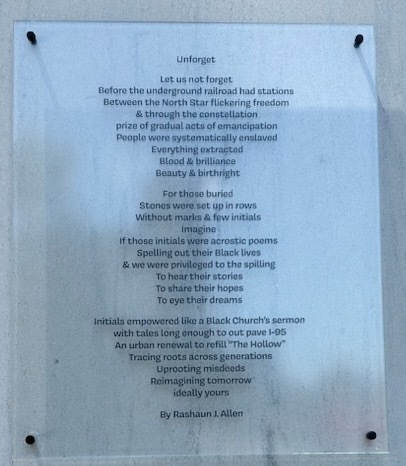
March 16, 2022
The Youth Are Artists Too
“Will the youth be passionate about their art?” I ask myself this question whenever I workshop with them. Some participate in their chosen craft just ‘cause their parent said so. Others, I hope, have their sights set on mastering their craft. Between January and February this 2022 year, I instructed, “More Than A Statement” a three-part writing workshop series that helped high school youth who were a part of Artwestchester’s Young Adult Leadership Council write Artist and Personal Statements to apply for scholarships, get into dream universities and even carve out paths to become professional artists. And to my surprise, I was floored by their enthusiasm.
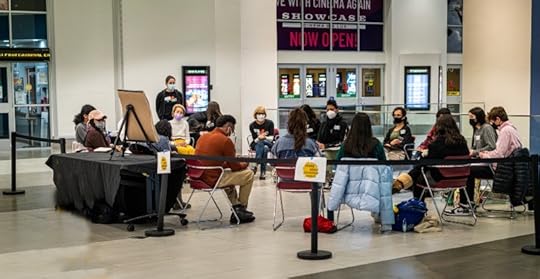 A wide shot of Artwesecthester’s Young Adult Leadership Council in a “More Than A Statement” writing workshop.
A wide shot of Artwesecthester’s Young Adult Leadership Council in a “More Than A Statement” writing workshop.Due to increased COVID-19 outbreaks in and around the Westchester area, I along with Artsweschester ended up running one virtual and two in-person workshops. My position is and was safety over everything. Regardless, the youth would have the material to carve out their chosen statements. In our only virtual workshop via Zoom, the 12-15 youth turned aspiring artists all had their cameras on and were attentive as I showed them slides about, “When Do You Use and Need Each Statement” and a writing prompt that asked, “What do you hope to convey through your art?”
To build on the slides and that particular writing prompt, in only a handful of minutes, each youth-inspired artist read what they jotted down or pasted it into the zoom chatbox. (Did I mention they also had a professional artist statement from an artist whose work was displayed in a Brooklyn Museum and a personal statement I used for a residency to work off of?) Afterward, I shared with them an “Artist Statement Flow Chart” and a “Five-Step Personal Statement” so that whichever statement they chose to create was broken down into manageable parts. They left the workshop charged with working on a draft to bring to our next class.
The next class, which was held at the White Plains City Center, to go alongside the youths’ rough drafts, I brought my personal statement that was part of the application that won me a Fulbright Scholarship, a grant for individually designed study/research projects or for English Teaching Assistant Programs. With it, I won enough money to live an academic year in Barbados to pursue and write about my Caribbean lineage in a forthcoming manuscript. Besides having the youth-inspired artists read my personal statement, they had to answer questions like, “How many drafts do you think was done before the final version?” And “What stood out about my personal statement that you could emulate in your own?”
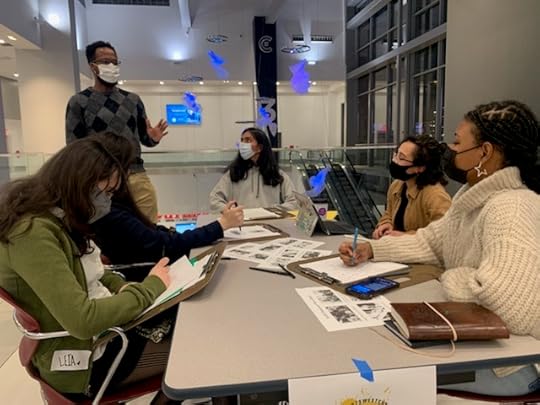 Rashaun J. Allen chats with Young Adult Leadership Council members about writing Artist and Personal Statements.
Rashaun J. Allen chats with Young Adult Leadership Council members about writing Artist and Personal Statements.Between two tables full of youth inspired artists wrongly guessing three drafts and happily chatting in person with each other, something clicked inside most if not all of them that said, “It was okay to bring their own identities into their particular crafts” just like I, an African-American, who infused my newly uncovered Bajan identity into my own writing.
In the final session, I partnered with Charisse A. Brown, a theatre artist, who along with myself provided popcorn-style feedback to the youth-inspired artists. After each one was nudged to read their artist or personal statement out loud, we took turns sharing what worked well and where there might be opportunities to improve in our respective fields. For each youthful artist, I jotted down notes to respond to their words. (Charisse responded to their voice and body language.) One piece of my feedback highlighted how a youth weaved her desire to paint alongside her Chinese heritage and in general connecting oneself to an organization or college could help decisions makers understand the value in the pending artistic partnership. On the other hand, I pushed back against many of them sharing “too many lists.”
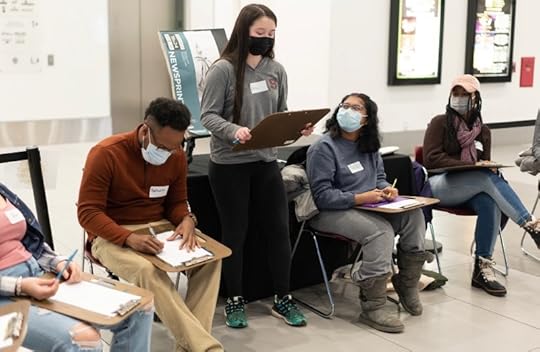 Rashaun J. Allen jots down notes to give feedback to a Young Adult Leadership Council member.
Rashaun J. Allen jots down notes to give feedback to a Young Adult Leadership Council member. Still, I couldn’t have asked for more from the youth. I was able to work with youth, no, artists who were passionate like me and utilized some of my own work as a writing artist to inspire future painters, visual, and writing artists to stay the artistic course. Unlike myself as a youth who was unaware of an artistic course to follow, each of them are tapped into a community of artists who like myself can show them a path as we still carve out our own creative direction.
—
Rashaun J. Allen is an Instructor of English at Westchester Community College and the author of several independently published poetry collections, including “The Blues Cry For A Revolution,” which was an Amazon Kindle Best Seller in African American Poetry. Find @rashaunjallen on Twitter and more of his work at www.rashaunjallen.com.
January 26, 2022
The Sounds of Success: A Walk Through Brooklyn Back Then and Now
Back in 2010, I was 22 years old and eager to find a way to put my own work out. But I didn’t know where nor how to begin a publishing journey. Instead, I got on stage to perform pieces that would be foundational to it. Why? My exposure to poetry wasn’t contemporary poets on the page, but poets from Def Jams Poetry. I’d finger snap from my screen alongside the engulfed crowd, captivated over the wordplay, the rhythm, and the blues. Afterward, I was constantly inspired and believed I, too, could create powerful poetry.
But if there was a literary world, I came from art out of space. I had written on and off for years based on mood, motivation, and everything in between. Yet, I didn’t know enough to land my poems in literary contests or magazines. Nor was I interested in pursuing an MFA. I had learned enough (so I thought) being a double major at SUNY Albany
I don’t recall the day or time, but I can clearly remember the decision to make A Walk Through Brooklyn. It was shortly after graduating from SUNY Albany and I landed a job handling claims at an insurance company. The money allowed me to rent my first apartment and fully transition into adulthood. But I still didn’t quite feel satisfied. And it wasn’t just the facts I was one of the few Black people there and the job entailed getting yelled at by random people all day long.
I was in this weird space of wanting to be a writer but not knowing how to support myself as one. The only writers I knew were professors. Even so, most of my interactions with them were centered around passing their classes. Back then, in my head, publishing and being a professor just came with the territory.
In reality, the life of a writer is a hard path, especially with no clear road map. What’s a query letter to a project kid? A fellowship to a first-generation college graduate? Or a residency to a young man with no parent to return home to? What I did know was that I had to put together a manuscript. I had several dozen poems to choose from between what I journaled, saved on word documents, and performed between high school and throughout college.
My goals were simple: aim for excellence and create something you can be proud of. This translated to reading books about publishing, working with distributors, beta readers, and creating opportunities out of my own art. When paperback copies of A Walk Through Brooklyn arrived at my apartment, I did everything I could think of to promote it. I messaged my Facebook friends list, emailed people, and texted friends. (I even cracked the Amazon Kindle Bester Seller list in African American Poetry.) But my boldest move was to set up book signings. I put on a suit, wrote up a pitch, drove to a handful of the nearest booksellers, and pitched whoever was a decision-maker.
Was I nervous?
Hell yeah!
But I told myself, “All I need is one yes!”
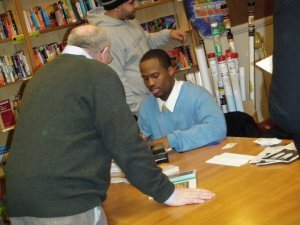 Circa 2010 the Book House Stuyvesant Plaza
Circa 2010 the Book House Stuyvesant Plaza
That first “Yes” came from the Book House of Stuyvesant Plaza in Albany. And I was hyped. My fraternity brothers, college friends, and a former professor showed up. And I performed in front of all of them. The support was so overwhelming I thought, If each book signing goes like this, I can afford to take care of myself as a writer. But that was far from the case the next book signing only a handful of people came. Still, I continued anyway: creating more partnerships with other bookstores, participating in book fairs like the Bronx Book Fair, and attending conferences like National Black Writers Conference to hear authors. Eventually, I obtained my MFA—which you don’t have to—but I did.
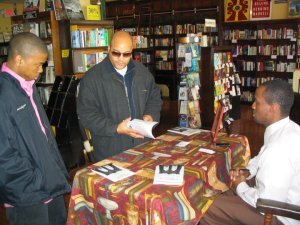 Circa 2010 Market Block Books
Circa 2010 Market Block Books
To think that journey began 12 years ago. Now I’m a professor with 3 poetry books; manuscripts and musings from other genres. And still writing. But one aspect of this journey still lingered. How could I recapture the spoken word feel? The audiobook of A Walk Through Brooklyn does just that. With it, you can hear how every word is supposed to sound. To me, it’s the sounds of success. To others, you hear the up and down experiences of a Black boy growing up in Canarsie. Regardless, I hope you decide to support my latest endeavor.
Order Your Audio




August 9, 2020
Book Review – Educated
How can a reader measure a book that shares a slice of someone’s life? Does he focus on the story itself or the delivery of the written word? I’d argue a successful book can’t thrive without both working together like fingers on a hand. Tara Westover’s “Education” succeeds in giving the reader a compelling story that draws a reasonable person from the beginning to the end. Although, a reader may wonder if revealing the family skeletons is a price too high for literary success. (I don’t get the impression the book is written to backstab or clout chase.) However, in Westover’s case and for those who operate without fear it can be therapeutic and a moving message for other people on how to (or not) deal with toxic relationships from the ones you love most.
Tara Westover’s “Education” is a memoir about a Mormon woman who has no formal education. Instead, she grows up in a Mormon household, with a conspiracist (or bipolar) father who weaves and justifies his words and actions from his understanding of the bible. Her Mom, a successful herbalist, and midwife, failed (or chose) not to see the havoc unraveling in her household. And siblings: one an abuser, another who received his Ph.D. like Tara, and another who betrayed her own reality to continue to be in the good graces of her parents. I paint a quick picture of Tara’s family to say most of those relationships were severed as she grows to become a critical thinker and scholar.
Still, Westover takes an interesting approach to create her memoir. She doesn’t just rely on her own memories. Besides utilizing her journal entries as a youngster, she gathered the memories of her surviving relationships in order to give the audience vivid shared memories that sometimes have conflicting details. She handles those conflicting details with notes sprinkled throughout the memoir and a final one at the conclusion of the book. However, I wish this due diligence was applied when deciding to use the N word. Could the memoir still not be great with its omission?
Education is one of those rare books that lives up to the hype surrounding it. Previously, I taught a chapter in my writing class. Now I’ve drawn inspiration from it on how to reimagine and approach some of my own writing. Her world is starkly different from my own as a black man who grew up in Brooklyn (and still survives systematic oppression), but her journey to find her voice, herself, her education is a journey I too can relate. In other words, Education is worth the time reading.
—
Rashaun J. Allen is the first Fulbright scholar in SUNY Stony Brook’s MFA in Creative Writing & Literature program history. A Vermont Studio Center and Arts, Letters, and Numbers residency recipient whose three independently published poetry collections: A Walk Through Brooklyn, In The Moment, and The Blues Cry For A Revolution became Amazon Kindle Best Sellers in African American Poetry. He has been a 2019 Tupelo Press 30/30 Project Poet, nominated for Sundress Publication’s 2018 Best of the Net Anthology in Creative Non-Fiction and was a 2017 Steinberg Essay Contest Finalist in Fourth Genre. His writing has appeared in TSR: The Southampton Review, Tishman Review, Rigorous, Auburn Avenue, Poui, and River Styx.
July 25, 2020
Book Review – Heavy
Why would a reader be interested in a Southern black man talking through his problems with his Mom? “Heavy: An American Memoir” by Kiese Laymon takes the reader on a journey as he unravels to her important experiences growing up that was lied about, denied, and/or omitted. Between those experiences what is revealed is a mother and child’s intimate and dilapidated love for each other.
In fact, the “Black Abundance” of dilapidated love comes through others who impact his life as well such as his Grandma, and his mother’s abusive boyfriends. Each are fleshed out three-dimensional characters the reader witnesses during good and bad times. His mother held him to academic excellence while modeling detrimental behaviors such excessive gambling.
My favorite aspect of “Heavy: An American Memoir” was Laymon’s use of language. Through his black Southern Mississippi cadence, he wrote, “We laughed, laughed, and laugh until we don’t” that captured many ha-ha moments. Then how he weaved his phrase “Black Abundance” throughout the memoir ‘til it became a phrase that captured his friendship while bringing the reader along.
Laymon was able to show the weight of intergenerational problems such as his family’s lack of money. His Grandma washed white peoples’ clothes to have a little extra, his mother struggled to raise him with academic checks, and his own as an adjunct. Although his experience being an adjunct remained least interesting to me. It was intriguing to discover how he navigated higher education’s purgatory.
Still, Layman’s depiction of his weight struggles, being black in the deep south, and in that frame, was a journey worth reading. No one’s journey is total uphill. It’s falling, falling, getting up, falling and then maybe making progress. He nailed what failure and success can look like through his weight battles and becoming a writer. I can see myself teaching (or reading) “Heavy: An American Memoir” again. And I encourage anyone who likes memoirs, a good heart aching story to check it out.
–
Rashaun J. Allen is the first Fulbright scholar in SUNY Stony Brook’s MFA in Creative Writing & Literature program history. A Vermont Studio Center and Arts, Letters, and Numbers residency recipient whose three independently published poetry collections: A Walk Through Brooklyn, In The Moment, and The Blues Cry For A Revolution became Amazon Kindle Best Sellers in African American Poetry. He has been a 2019 Tupelo Press 30/30 Project Poet, nominated for Sundress Publication’s 2018 Best of the Net Anthology in Creative Non-Fiction and was a 2017 Steinberg Essay Contest Finalist in Fourth Genre. His writing has appeared in TSR: The Southampton Review, Tishman Review, Rigorous, Auburn Avenue, Poui, and River Styx.
July 11, 2020
Book Review – Becoming
“Becoming,” by Michelle Obama, is her journey growing up in the South Side of Chicago in arguably a model black family household: married parents, an athletically inclined brother and sharp minded young Obama. As the story evolves, Obama peeled back her tough exterior to show moments of feeling “Not good enough” navigating Princeton and then Harvard Law School. Then, she shared snippets of her once in a life time—eight years’ worth of—experience as the first lady of the United States of America; despite not being a fan of public life. The backdrop of this memoir is the story of an amazing woman who rear view mirrors her life to give her audience a few gems of wisdom and missteps in a linear way.
I am bias against celebrity written books. Often, they’re written by someone else to capture their voice and eat up way too much retail space for full-time writers. So, I wondered if Obama penned “Becoming?” Not only did she but the whole world loved it.
Although, the world loved “Becoming” I found it challenging to crush on. Why? The prose was clear but less imaginative. Still, there were moments that stayed with me. She lifted the veil about tough topics like going to therapy to save her marriage, the difficulty of conceiving (I can only imagine the courage it took to be this vulnerable) and trying to hold on to herself without losing too much ground to young Barack Obama’s political ambitions to become President of the United States of America.
Obama fully embraced her African Americanness but never condemned the systemic oppression that all of us poor, rich, gay or straight face in the U.S. (I know it’s not her responsibility and if she did she’d just get painted as a “Angry Black Woman.”) But without speaking more openly about it readers particularly young ones are more susceptible to think the U.S. is a meritocracy.
Instead, Obama’s book embodies the pragmatism of her now immortalized line, “When they go low, we go high.” This is clearly shown in the Pastor Jeremiah Wright controversy that ultimately severed the ties between the Obamas and the pastor who married them. In 2008, more than a handful of media outlets ran sound bite airings of some of his most fiery statements denouncing terrible actions committed by the United States. Obama could have set the record straight, spread further the already severed ties but chose to write it off as an angry man upset over past grievances.
One of the most enlightening aspects of her memoir was her disclosure about how President Barack and her raised: Sasha and Malia. She empowered them to suggest their own curfews and held them accountable. As someone who did not grow up in a two-parent household but hopes to raise a family in one, I was intrigued. Furthermore, she wrote about after working extremely hard on becoming a lawyer, she ultimately didn’t like it. How many of us have found ourselves in similar situations?
Overall, “Becoming” was an interesting read that I didn’t love. Maybe it lacked the sharp prose and figurative language I would get from a novelist. Maybe my expectations were too lofty which interrupted my ability to enjoy Obama’s words. However, I could see myself teaching a chapter or two. And I would tell a potential reader sampling pages in an independently black-owned book store to, “discover her words for yourself.”
–
Rashaun J. Allen is the first Fulbright scholar in SUNY Stony Brook’s MFA in Creative Writing & Literature program history. A Vermont Studio Center and Arts, Letters, and Numbers residency recipient whose three independently published poetry collections: A Walk Through Brooklyn, In The Moment, and The Blues Cry For A Revolution became Amazon Kindle Best Sellers in African American Poetry. He has been a 2019 Tupelo Press 30/30 Project Poet, nominated for Sundress Publication’s 2018 Best of the Net Anthology in Creative Non-Fiction and was a 2017 Steinberg Essay Contest Finalist in Fourth Genre. His writing has appeared in TSR: The Southampton Review, Tishman Review, Rigorous, Auburn Avenue, Poui, and River Styx.
July 4, 2020
Ain’t A Black Holiday
Click the video below; I passionately read “Ain’t A Black Holiday” from The Blues Cry For A Revolution.
–
Rashaun J. Allen is the first Fulbright scholar in SUNY Stony Brook’s MFA in Creative Writing & Literature program history. A Vermont Studio Center and Arts, Letters, and Numbers residency recipient whose three independently published poetry collections: A Walk Through Brooklyn, In The Moment, and The Blues Cry For A Revolution became Amazon Kindle Best Sellers in African American Poetry. He has been a 2019 Tupelo Press 30/30 Project Poet, nominated for Sundress Publication’s 2018 Best of the Net Anthology in Creative Non-Fiction and was a 2017 Steinberg Essay Contest Finalist in Fourth Genre. His writing has appeared in TSR: The Southampton Review, Tishman Review, Rigorous, Auburn Avenue, Poui, and River Styx.
– Featured Image by @Brea.Soul from Nappy.co
June 28, 2020
Book Review – Forest Primeval
Who is Vievee Francis? I wondered. She was at the Vermont Studio Center, the largest international artists’ and writers’ residency in the United States, at the same time as me. Yet, I was confused why poets around VSC were doting over her. I had never heard of her. But once my ears heard her words I was intrigued. Then, after reading Forest Primeval, a 2017 Kingley Tufts Poetry Award winner, and a collection of poems about beauty and abuse; city and nature; reimagining fairy tales I was wowed.
Her poems have the ability not only to make you feel—but think. Her poem, “Taking It” about abuse in a domestic relationship was powerful. She writes, “I never remember the knuckles, though his hands was bare, though their hands were bare. I remember the impressions left of this skin, the wilting and the welting.” Those words and many others made the pain in this poem come alive.
In the poem, “Fallen” she grapples with not being seen as beautiful when she writes, “But I was never the light of my father’s eyes, or any brother’s (that deep-hushed choir) so there was no height from which to fall.” A heartbreaking reality for her and realization how many of us black men don’t see the beauty in black women. How foolish we can be.
Her poem “On the last day” was my favorite. She writes, “Those who were wronged will not be righted,” “Those without empathy have already perished.” “Monsters will feast upon beauty as they have always done,” & “You will remain exactly where you are.” This poem stung! It was a reminder that most of us will not change.
Forest Primeval is broken down into six sections each representing a distinct change in the pieces. In section four several of her poems took on fairy tales like “All The Fuss Over A Rose…” which created a prose poem around beauty and the beast— trying to understand the beauty within the best. And the poem “Wolf” which was a play-off of little red riding hood.
Forest Primeval had 54 poems that covered about 93 pages. After reading it, I’m left wanting to reread it again and dive deeper into the poems. Each poem I read at least twice and each time it offered me a different impression than before. She utilized different poetry forms to create a poetry collection that can’t be summed up with one word. Instead, I offer three: Subtle, shocking and sincere.
–
Rashaun J. Allen is the first Fulbright scholar in SUNY Stony Brook’s MFA in Creative Writing & Literature program history. A Vermont Studio Center and Arts, Letters, and Numbers residency recipient whose three independently published poetry collections: A Walk Through Brooklyn, In The Moment, and The Blues Cry For A Revolution became Amazon Kindle Best Sellers in African American Poetry. He has been a 2019 Tupelo Press 30/30 Project Poet, nominated for Sundress Publication’s 2018 Best of the Net Anthology in Creative Non-Fiction and was a 2017 Steinberg Essay Contest Finalist in Fourth Genre. His writing has appeared in TSR
June 22, 2020
How Your Donations Honored Bri & Aided Other Black Lives
To honor Breonna Taylor’s 27th Birthday, on June 5th, I decided to give away FREE copies of #TheBluesCryForARevolution. I didn’t know if it would have any impact nor was I sure how this move would be received.
The result was beyond my expectations and the outpour has been positive. But if all you’ve seen are social media posts and emails, how would you know? Therefore, I’m being transparent and sharing what your support did in roughly two weeks.
6 copies of #TheBluesCryForARevolution was donated to help raise $220 towards honoring Bri and other black lives. This was broken down via the individual donors into 5 different organizations including money directly to Bri’s family. What I am unable to measure is how my posts, no, our conversations can continue to keep her memory fresh on our collective minds until justice is served.
Although Breonna Taylor’s Law was passed and it will ban No-Knock warrants in Louisville, Kentucky the three officers #BrettHankison, #JonathanMattingly, and #MylesCosgrove have not been charged. (Only Brett Hankison is being fired.) And after three months of an investigation the incident report released is minuscule in details and falsely claims there was “no force entry” and “no bias” motivation.
Still, a precious life was recklessly loss and I hope Mayor Greg Fischer and Attorney General Daniel Cameron give Breonna Taylor the justice she deserves by having those officers answer for the crime they committed.
Please take this visual as a tool to help motivate you to take action that you believe in despite how small. And thank you for believing in mine.
[image error]
–
Rashaun J. Allen is the first Fulbright scholar in SUNY Stony Brook’s MFA in Creative Writing & Literature program history. A Vermont Studio Center and Arts, Letters, and Numbers residency recipient whose three independently published poetry collections: A Walk Through Brooklyn, In The Moment, and The Blues Cry For A Revolution became Amazon Kindle Best Sellers in African American Poetry. He has been a 2019 Tupelo Press 30/30 Project Poet, nominated for Sundress Publication’s 2018 Best of the Net Anthology in Creative Non-Fiction and was a 2017 Steinberg Essay Contest Finalist in Fourth Genre. His writing has appeared in TSR: The Southampton Review, Tishman Review, Rigorous, Auburn Avenue, and Poui and River Styx.
May 1, 2020
Rewind. Replay. Relax.
Whaddup Peeps?
A week or so ago I had the opportunity to be on Poets in Pajamas, a Reading Series, hosted by Sundress Publications, that connects readers and writers around the world. What happened? About 20 minutes of poetry from #TheBluesCryForARevolution and 10 minutes of questions and answers. Between all of that, the comments were pouring in:
“Amazing Writer.”
“Love the ending.”
“Major snaps”
If you missed it don’t worry the replay is below:
–
Rashaun J. Allen is the first Fulbright scholar in SUNY Stony Brook’s MFA in Creative Writing & Literature program history. A Vermont Studio Center and Arts, Letters, and Numbers residency recipient whose three independently published poetry collections: A Walk Through Brooklyn, In The Moment, and The Blues Cry For A Revolution became Amazon Kindle Best Sellers in African American Poetry. He has been a 2019 Tupelo Press 30/30 Project Poet, nominated for Sundress Publication’s 2018 Best of the Net Anthology in Creative Non-Fiction and was a 2017 Steinberg Essay Contest Finalist in Fourth Genre. His writing has appeared in TSR: The Southampton Review, Tishman Review, Rigorous, Auburn Avenue, and Poui and River Styx.



